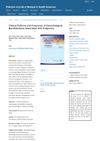 3 citations,
March 2024 in “International Journal of Women’s Dermatology”
3 citations,
March 2024 in “International Journal of Women’s Dermatology” Spironolactone may help women with hidradenitis suppurativa.
2 citations,
November 2022 in “Veterinary sciences” The interdigital gland of Vembur sheep shows sex-based differences in size and chemical makeup, possibly affecting communication and disease protection.
 1 citations,
July 2023 in “F&S Reviews”
1 citations,
July 2023 in “F&S Reviews” Some common medications may harm male fertility by affecting hormones, sperm production, and sexual function.
 September 2014 in “Hair transplant forum international”
September 2014 in “Hair transplant forum international” Galenic lotions can effectively treat different patterns of hair thinning in men and women.
89 citations,
March 2001 in “Endocrine practice” The guidelines help doctors diagnose and treat hormone-related disorders in women.
46 citations,
December 2014 in “Epilepsy & behavior” Some antiepileptic drugs can cause weight gain and hair loss, especially in women.
 29 citations,
October 2020 in “eLife”
29 citations,
October 2020 in “eLife” Higher testosterone levels can increase the risk of certain diseases like type 2 diabetes in women and prostate cancer in men, but can also protect against autoimmune diseases and hair loss. It also affects body fat and bone density.
 3 citations,
September 2021 in “International Journal of Molecular Sciences”
3 citations,
September 2021 in “International Journal of Molecular Sciences” Androgens and a high-fat diet may increase the risk of severe COVID-19 in women with PCOS by upregulating certain proteins in the heart and kidneys.
 August 2024 in “Frontiers in Nutrition”
August 2024 in “Frontiers in Nutrition” Antioxidant-rich diets may reduce hair loss risk, while pro-inflammatory diets may increase it, especially in women.
 1 citations,
January 2022 in “Transgender health”
1 citations,
January 2022 in “Transgender health” Hormone therapy in transgender individuals can increase acne and affect hair growth and loss.
219 citations,
January 2006 in “Drug Metabolism Reviews” DHEA affects multiple receptors and may help with metabolic issues, but its safety and effectiveness in humans are unclear.
 8 citations,
February 2021 in “Journal of the American Heart Association”
8 citations,
February 2021 in “Journal of the American Heart Association” Medical castration in prostate cancer patients can increase the risk of serious heart rhythm problems, so it's important to monitor heart activity during treatment.
19 citations,
April 2018 in “Clinical cardiology” Older men with low levels of a testosterone byproduct had a higher chance of developing an irregular heartbeat.
7 citations,
October 2017 in “Journal of exotic pet medicine” A guinea pig with ovarian cysts had a uterine infection and abnormal uterus lining due to a piece of hay inside it.
 2 citations,
January 2023 in “Journal of Clinical Medicine”
2 citations,
January 2023 in “Journal of Clinical Medicine” People with hair loss conditions may also have thyroid disorders, but more research is needed to understand the connection.
 1 citations,
April 2023 in “American Journal of Clinical Dermatology”
1 citations,
April 2023 in “American Journal of Clinical Dermatology” Chronic telogen effluvium may not be a unique condition and could be confused with other types of hair loss.
 September 2023 in “Gynäkologische Endokrinologie”
September 2023 in “Gynäkologische Endokrinologie” Menopause causes skin and hair to become drier and thinner, but hormone therapy can improve these conditions.
54 citations,
October 2010 in “Clinics in dermatology” Diet, especially dairy and high-sugar foods, can cause acne.
 February 2023 in “Pakistan Journal of Medical and Health Sciences”
February 2023 in “Pakistan Journal of Medical and Health Sciences” Pregnancy can cause various skin changes, with stretch marks, dark lines on the abdomen, and skin darkening being the most common.
227 citations,
November 2004 in “Medicine” Older adults diagnosed with lupus show less severe symptoms but have a lower survival rate, often due to age-related factors.
January 2024 in “Cosmetics” Menopause worsens skin, hair, and nails, affecting self-esteem and quality of life.
 January 2024 in “Medicine”
January 2024 in “Medicine” Hypothyroidism is often linked to the hair loss condition telogen effluvium.
December 2022 in “Frontiers in Microbiology” The scalp microbiome is more diverse and may be more important in hair loss than the gut microbiome.
 January 2025 in “Biomedical Reports”
January 2025 in “Biomedical Reports” Telitacicept helped stabilize complement levels in a patient with lupus and thyroid cancer.

There are many ways to treat Polycystic Ovary Syndrome, including lifestyle changes, surgery, and various medications, but more research is needed for better treatments.
 September 2024 in “Advanced Biomedical Research”
September 2024 in “Advanced Biomedical Research” Auriculotherapy and Aslagh capsules are as effective as metformin for treating PCOS symptoms, with auriculotherapy slightly better for reducing hair growth.
46 citations,
April 1982 in “Journal of the American Academy of Dermatology” Isotretinoin shrinks sebaceous glands without affecting hair or skin color, unlike etretinate.
 September 2023 in “F&S reports”
September 2023 in “F&S reports” PCOS may increase the risk of mental health issues like depression and anxiety.
 2 citations,
May 2023 in “Current Nutrition Reports”
2 citations,
May 2023 in “Current Nutrition Reports” Eating a Mediterranean diet and taking certain supplements may improve symptoms of PCOS.
 1 citations,
January 2022 in “Journal of Biosciences and Medicines”
1 citations,
January 2022 in “Journal of Biosciences and Medicines” Understanding how androgens and their receptors work can lead to improved treatments for skin diseases.



















